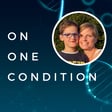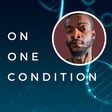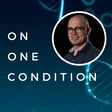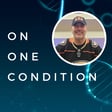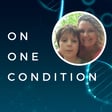Become a Creator today!Start creating today - Share your story with the world!
Start for free
00:00:00
00:00:01

Episode 39: Lauren McDermott - Stiff Person Syndrome
Stiff Person Syndrome (SPS) is a rare condition that leads to painful muscle spasms. Lauren believes she had her first symptoms in early 2010s, although she was only diagnosed 5 years ago. She explains how the condition affects her body and her mobility. She also shares the impact it has had on her mental health and how she manages her energy levels to keep SPS at bay as best as she can.
The song Lauren chose is It was a good day by Ice Cube.
Transcript
Introduction: Sylvain Bertolo & Lauren McDermott
00:00:00
Speaker
Hi, I'm Sylvain Bertolo, and you're listening to On One Condition, a podcast to raise awareness about health conditions by listening to people who live them every day.
Lauren's Health Update
00:00:11
Speaker
My guest today is Lauren McDermott, and we're going to talk about Stiff Person Syndrome. Hi, Lauren. Hello. Nice to have you on the podcast. How are you doing?
00:00:23
Speaker
Thank you for having me. A little bit out of it today, which is per usual. It's early in the morning and a little
Song Choice: 'Today Was a Good Day'
00:00:32
Speaker
bit tired. Didn't sleep too well. I was up finger pricking all night for low blood sugar.
00:00:39
Speaker
But I'm here and I'm ready to do the podcast. Thank you. I'm glad you joined. Well, something we'll talk about shortly, I'm sure, but as you know, I love starting with a song. So could you tell us which song you chose and why?
00:00:55
Speaker
I chose. It's by Ice Cube. It's called Today Was a Good Day. And it came out, I think, roughly mid 90s when I was in high school, and I was very much into hip hop. And it's
00:01:12
Speaker
You know, the lyrics don't have meaning to me, but it's just something about that song. Whenever it would come on, it would always put me in a good mood. And so I like to play it now when I have good days because there's more bad than good. And so when it's a good day, I feel like it, you know, I try to celebrate it as much as I can. And I like to put that song on and it kind of
00:01:35
Speaker
takes me back to the 90s when things were easy in high school and all you had to worry about was trying to fit in at school and get some good grades, right? Life was simple back then. Yeah. I love those songs that remind you of time passed and hip-hop celebrated 50 years, last year actually.
00:01:58
Speaker
I was very into it, and so was my brother, so that's something also too that him and I bonded over. We would definitely lift weights and play our hip-hop music at the same time. Nice, I love that.
Understanding Stiff Person Syndrome (SPS)
00:02:12
Speaker
Well, you've mentioned finger-pricking during the night, so I think we should start here. Why? I'm not really sure what's going on.
00:02:23
Speaker
Maybe hypoglycemia, possibly I'm in honeymoon phase or developing type 1 diabetes, late onset, which is autoimmune. And that runs parallel a lot with SPS.
00:02:40
Speaker
It's one of the comorbidities, anemia, thyroid disease, you know, like a lot of people have Hashimoto's. There's just a lot that you get once it seems like you have SPS, you're highly likely to develop one or two or even more autoimmune conditions. A lot of people in the community have
00:03:06
Speaker
most of them have like three to four. It's like the average. Yeah. Wow. Okay. So not only you have to deal with SPS, but then there's a potential or a risk for additional conditions coming up in the future. Yeah. One woman I know actually just got diagnosed with Parkinson's. She has Parkinson's and stiff person syndrome. And my heart goes out to her. She's a friend and
00:03:34
Speaker
I can't imagine how hard that must be to have both of those conditions. Just having one is enough. How did you realize that you have SPS? That's a loaded question. You start where you want to. Well, looking back, after you realized some signs.
00:04:00
Speaker
kind of back in 2011-ish, I started to get a lot of really odd muscle knots that kind of felt like
00:04:11
Speaker
frozen chickpeas or frozen peas, like inside my scapula of my back and around my shoulder blades and all that. And went for massages once a month. And I did that for five years. And that seemed to help. And I just kind of chalked it up to stress. You know, I had a very stressful job. I worked very long hours. I sat at a desk, right?
00:04:38
Speaker
I did work out a lot though still. I worked out roughly three to five days a week always and lifted weights. So I was fit. I cared about what I ate and all that. But yeah, it's just these knots just kept coming. So I just, and I'm a side sleeper and I was getting older. So I just kind of thought wear and tear and stress. And this is a self-care that I have to do is this massage, just going to maintain my life.
00:05:08
Speaker
Then I noticed on long drives because I like to drive a lot, like to travel a lot. Like an eight-hour drive to me was no big deal and I would do it straight through and not have to switch off with anybody. But as I kept traveling and doing things with friends and family, I would get somewhere and I'd say, man, my neck is just killing me. It wasn't normal because I had, again, traveled so much.
00:05:33
Speaker
There was some of that definitely always high amounts of stress in my life just between work and some kind of toxic relationships romantically, unfortunately. But it just got more progressive, you know, it's just the tight neck. And I also noticed my lower back growing up, despite being fit and working out and lifting weights and all this stuff.
00:06:01
Speaker
I almost noticed my lower back would hurt me doing dishes, which is so strange. And then when I would go to the mall and walk around, it would hurt. But yet I was running and, you know, doing machines at the gym. So it was just very strange. There was a couple odd things.
00:06:17
Speaker
That takes me back to SPS has hyperlordosis, which is extra curvature of the lower spine. So that probably is why I was experiencing that and not really realizing it's funny. There's a term, I don't know if you've heard the term sway back. It's when they say like, you know, a woman's kind of figure is like, you know, small waist and then a big butt, right? So you kind of, a lot of patients have that sway back with SPS, not all.
00:06:45
Speaker
But I think that's why my lower
Diagnosis Journey of SPS
00:06:47
Speaker
back was hurting. But fast forward to 2018, massages just stopped working. I started going every two weeks thinking maybe I need more massages. And then it became extremely painful to the point where I was crying getting a massage.
00:07:04
Speaker
And I had to stop because it gave me no benefit. And I decided to go to a sports medicine doctor and try to put this in short. Basically, we did a ton of testing. We did lidocaine injections, dry needling, Botox,
00:07:24
Speaker
All my tests were coming back negative for all kinds of autoimmune diseases. All my regular blood work was fine. And basically nothing was helping. Everything made it worse. I did acupuncture, cryotherapy, chiropractors, you name it. Like we did a sleep study. Am I getting enough oxygen to my muscles? We did posture exercises.
00:07:51
Speaker
And my posture just kept rounding forward and forward and forward and everything in my shoulder girdle area was just getting tighter and tighter. Okay. And she was going to chalk it up to fibromyalgia. She wanted to try Lyrica and I said, it just doesn't sit with me. I don't think it's fibromyalgia when I read about it. Yeah. There's some similarities to what I'm experiencing, but I just wasn't ready to accept that. I just didn't think it fit. So.
00:08:20
Speaker
I finally got into a doctor at Penn. I had an appointment coming up, and strangely enough, I sat down with someone that I worked with because he noticed in work meetings that I was walking out crying, which is very unusual for me. One day,
00:08:41
Speaker
someone came up from behind me at work and put their arms on my shoulders and I freaked out, which now I know is called the startle response for SPS because it was painful and I turned my neck too quickly and because everything's already so tight. It
00:08:57
Speaker
just, it kind of was starting to create a spasm, which I didn't realize was a spasm at the time. I just didn't, it felt like my neck was tight. But I sat down with him and I kind of went over all my symptoms and told him all this stuff that was going on. And he really listened to me for about an hour. So that's that. And about probably a week or two later, he sent me an email and I think I got it in the morning when I woke up and he, I had been doing all my own research while seeing a sports medicine doctor for six months. I'm researching,
00:09:26
Speaker
Muscle spasm conditions anything, you know, all kinds of things never came across stiff person I mean, there are so many conditions with muscle spasms that it's you could just go on for you know Like a year and research these things. Yeah But I got an email from him
00:09:43
Speaker
and he said, check this out. This aligns with some of the stuff that's going on with you. I read it and I started crying immediately. My boyfriend that I was living with at the time, I described it to him and I read it out loud. He had a look of shock on his face because we both knew this finally fits. After all this time,
00:10:07
Speaker
And it's also scary because, you know, it's progressive. There's no cure. They don't even really know what causes it. And, you know, there's various types and it's, I was watching videos, you know, my, I'm not on social media other than LinkedIn where we met. And my boyfriend at the time was looking on Facebook and Instagram for me and what I was seeing.
00:10:33
Speaker
To be honest was horrifying it was very scary and
00:10:39
Speaker
I said, I'm glad I found this or my coworker found it, but oh my God, if this is what I have, my life is going to change forever and this is serious. I knew it was serious
Daily Life with SPS
00:10:53
Speaker
because the fact that we hadn't found anything yet told me that, and I know my body really well over the years with any kind of medical issue I had. I had a feeling in the back of my head that this is something really weird and really serious because
00:11:09
Speaker
Fast forward, honestly, like a month. And I was at a point that by the time I got into that pen appointment at Penn Medicine in Philadelphia, I couldn't put my hair in a ponytail. I could barely brush my teeth. I couldn't dress myself. Was this linked to the pain? Like where was the pain?
00:11:33
Speaker
It's so basically from the top of the neck to the mid back, chest muscles, back muscles, shoulder muscles, everything in the neck. So kind of like the cervical spine area. All of that was getting just locked up and it was so tight. The mobility was so limited. So it wasn't a weakness, but it was because you're so tight that you literally couldn't even raise your arms up.
00:12:02
Speaker
You couldn't turn your neck all the way, so I started to be able not to be able to drive. I couldn't cook for myself. I couldn't dress myself. I couldn't bathe myself. Everything was getting so tight. Sorry, go ahead. Could you still go to work then or do you have to stop working? I pushed through.
00:12:22
Speaker
a month of work with dealing with a lot of this and probably shouldn't have been driving to work because I could really turn my neck, but I had to work. I had a job. Then the two weeks before the appointment, I started working from home because they could tell I was doing really bad. I said, look, in the interim, I'll try to do as much work as I can from home.
00:12:48
Speaker
until I figure out what's happening. And the day before I went in for my appointment, my right arm was completely frozen into place. The entire arm was so stiff and hurt so bad, I could not move it in any direction.
00:13:05
Speaker
upside, back, shrug my shoulder, nothing. Really? And that's what it got real scary. So basically, it was kind of like moving around, and that's what SPS does. It can affect any muscle in the body. People have tongue spasms. I myself have had a throat spasm.
00:13:27
Speaker
which I couldn't eat. I couldn't talk. I couldn't drink fluids for five hours it was going on and it basically felt like I was being strangled all over my neck, you know, with like a large set of hands and just utter pain and kind of like your facial muscles will palpitate and then like the chest muscles. So like everything kind of surrounding that area too is very active and then it's
00:13:56
Speaker
after coming out of a five-hour spasm, you're just, you're beat. It's as if you ran a marathon, ended an Iron Man, and you're just done. And how do you, how does it stop? Do you do something like in that example, did you do something during those five hours to make it stop? Or is it just a case of waiting for it to pass?
00:14:21
Speaker
It depends. For me personally, for a long time, I had nothing but to just wait. Typically, if possible, it's get into a dark room that is quiet and get on a heating pad and put heat wherever the spasming is. Usually when you're in spasm, you cannot really necessarily fully massage it depending on what area it's in. It's weird.
00:14:50
Speaker
If my upper body's in a massage and a spasm i'm sorry i can't massage it because that's where sps started so that's the worst for me okay but if i get a spasm in my leg i can massage that weird so because that was affected later on cuz i eventually move through my body.
00:15:11
Speaker
But you basically for me I have since I have the startle response which not everybody has but I need you know bright lights and loud noises and lots of stimulation is too much for me especially when in a spasm you need to it's basically like you just have to isolate yourself.
00:15:30
Speaker
and you have to ride it out with the heat. But now I have been prescribed, I'm able to take a little extra Valium. So benzodiazepines are the main course of treatment they start with. Yeah. So that's basically what happened with me when I went to Penn. They ran a couple more tests because they said, you know, you honestly have had all the testing really done. We don't have much more for us to test.
00:15:59
Speaker
I think maybe an MRI or two and a little bit more blood work, but of course I came up negative for the one antibody that's typically associated with this disease, which is called GAD.
00:16:11
Speaker
But by that point, I had already seen so many doctors and had so many tests that they believed me. And they said, yeah, we do think this is what it is. So let's start you on Valium and see how your body responds. And wildly enough, within probably about 1.5 weeks of on a very low dose of Valium, I had already noticed that
00:16:38
Speaker
I, oh, look, I can kind of shrug my shoulder. I can sort of move this arm almost up to shoulder height, you know? And so since I responded positively to that, that's what gave me the diagnosis, but still kind of to this day, I'm considered atypical because I don't have the antibody. However, there's a couple other antibodies that are associated with SPS that I was also negative for.
00:17:08
Speaker
But they keep coming out with studies, especially there was one that just came out. My current neurologist at Thomas Jefferson University Hospital, who still runs studies, he used to work at the NIH. He's been studying SPS for over 50 years.
00:17:25
Speaker
Um, he is, um, studying more proteins slash antibodies. Um, so he's just trying to find, I believe maybe that slam dunk antibody that maybe everybody has. He's studying families where interestingly enough, um, let's say like the child will be gad negative like me, but have SPS and then the parents.
00:17:53
Speaker
will begad positive but not have SPS.
00:17:58
Speaker
but perhaps they have comorbidities like type 1 diabetes or thyroid disease. He's trying to study a few of those to see also, I assume, if there is a genetic component because right now, it's not there, it's unknown. How do you say it? Do you yourself keep track of studies that are going on or is it through your doctors?
Support Systems and Community
00:18:26
Speaker
Well, every time I talk to my neurologist, it's a million questions. It's like, what about this drug? What about this study? And someone in my support group said this, and their neurologist is doing that. So it's just, yeah, a million questions to him. And what I like about my doctor is he's originally from Greece.
00:18:42
Speaker
I believe he still has some labs in Europe and he has contact with doctors in Europe. So at least we get some international information, if you will. So I feel like he has a good grasp on what different people are doing.
00:18:59
Speaker
So yeah, obviously him, but I have a Google scholar alert, um, for anything new that comes out first of person syndrome. I look on pub med a lot and I have through my support group. Um, we have calls and I also have a text with about eight other women that have are like my core group. Um, and we are constantly sharing information and
00:19:26
Speaker
I tell you what, when you have something like this, you have no choice but to become smart, right? And I'm not trying to say that I'm smart, but I mean, maybe I'm not, but these women are unbelievable in their knowledge and their pursuit of, you know, research and just constantly questioning things and just by sharing like, oh, hey, I had this symptom too, or, oh my God, I can't believe that that happens to you. I mean, for example, I get this,
00:19:57
Speaker
feeling that I have spiders crawling on my head. And it doesn't happen all the time. I thought perhaps it was a medication side effect, or maybe I was losing my mind. And I brought it up on a call, on a support call, and I said, I know this sounds crazy, and I don't like using the term crazy, but I know this sounds silly, I guess I should say.
00:20:23
Speaker
But does anybody get this sensation? What do you know? Like two or three women. Oh my God, I say the same thing to my husband. Is there something on my head? I feel like something's crawling on my scalp. Very weird.
00:20:38
Speaker
it's particularly the head, and I don't know if it's maybe muscle movement, because I've actually had spasms in my eardrum and behind my ear. There's muscles in so many places, so depending on what type- Kind of everywhere in the body, yes. Yeah, so it's pretty wild, but they are a wealth of knowledge, and they have been so much
00:21:06
Speaker
so much help and especially with me going through this possible hypoglycemia type 1 diabetes journey. There's a couple of women in the SPS group that have it so I have to lean on them heavily because I don't know anybody else with type 1 diabetes and it's hard when you have
00:21:25
Speaker
SPS and you're in perimenopause, right? And you also just normal human being that might have like sinuses acting up one day, but when you wake up with a headache, it's, is my neck tight? Is it SPS? Is it my period or perimenopause or hormonal?
00:21:44
Speaker
Is it low blood sugar? You go down this rabbit hole of not knowing what's causing what. Honestly, half the time the doctors don't know either. I can imagine. You touched on a couple of things that I want to go back to. First one, you said that you need to apply heat on where it hurts or where you have spasms.
00:22:13
Speaker
It's muscular, so I get that. But then being in a dark and quiet space, do you know what impact it has? Is it because you need to try to relax as much as possible? Or why is the light, for example, affecting you in those moments?
00:22:38
Speaker
It's not the same for everyone, but it just seems like our bodies are, um, the theory is that our GABA is being attacked in our bodies. Don't ask me how to pronounce what GABA is, but it's G A B A and it controls a lot in your body. Um, basically it,
00:23:03
Speaker
it deals with hyperactivity and stress, anxiety, fear can, you know, level that up. And if you don't have enough gabbet in your body,
00:23:15
Speaker
it can't calm itself down. So then when you have any kind of outside stimulus, it's just making it all that much worse. For example, when I see my niece and nephew, I can't pick them up. They're two and five. I can only interact so much. I can't really play with them. But just being in their presence for a couple of hours and
00:23:40
Speaker
running around and it's fun, it's great, but it's stimulating for me like kids yelling and playing and throwing things around and just zipping around. When you take all that in and then you have a couple of adults and you're talking to them and you're moving your head a lot and there's lights and there's a TV on, it's
00:24:02
Speaker
I don't know. I kind of feel like it maybe seems the way sometimes maybe autistic people might feel, right? It's the accumulation and overstimulation and then a bit of proprioception as well.
00:24:18
Speaker
And then that seems to activate inside internally and starts to get the muscles going. So whenever I go out with friends and stuff, I try to sit at the head of the table because that way I can see everyone and I have to do minimal left to right turning of my head. Because if I have to keep turning my head, then the neck starts to tighten up.
00:24:41
Speaker
and you know first you're excited to see your friends so you kind of have the endorphins and you know the dopamine and oxytocin going and then that slowly wears off and yeah if you're in a restaurant and the music's a little too loud and everyone's chitter chattering and it becomes a lot and then by the time you get home again you feel like you've ran a marathon and all you did was go out for an early dinner.
00:25:05
Speaker
Yeah, yeah.
Adapting Exercise for SPS
00:25:08
Speaker
And so something else I wanted to ask you, going back to what you mentioned a couple of times, like doing a lot of working out. So it sounds like it's been with you for all your life almost. Can you still work out? Can you still remain active? How does it impact your mobility?
00:25:33
Speaker
So it'll be, this August will be five years since I was diagnosed. And it has taken that long to get back to a point where I can do, I can't do anywhere near what I was doing before. I was lifting very heavy weights, working out very consistently, working out hard bootcamp classes, you know, lifting a lot. And now it's more Pilates, stretching,
00:26:01
Speaker
gentle yoga, walking outside as much as possible, just for mental health as well. And just to feel like you're outside of the house because honestly, I don't get out very much. And if I do, it's usually doctor's appointments or some sort of therapeutic modality.
00:26:19
Speaker
Um, but it is kind of, um, for me getting on the intravenous immunoglobulin IVIG is really what helped the oral medications only got me to a certain point. And I responded well to IVIG, which not everyone does. Some people also have allergic reactions to it and have to do different types of infusions, which there are some others available that are a little more serious that are immunosuppressant.
00:26:47
Speaker
Again, some of them aren't effective either, but it wasn't until I did about six rounds of IVIG and I do it every month and I'm still doing it that I really was able to start getting back into working out and just had to set goals every day.
00:27:04
Speaker
Get outside and even if I walk two houses down Okay tomorrow. Let's try three houses down Mm-hmm, you know, let's see if I can do a sit-up and if it affects my neck Oh, I can't let me what other cut, you know, so you're it's constantly adapting and every day is different some days when you wake up you just know Nothing physical is happening today. And then you also have to plan if you know, you're going out and
00:27:31
Speaker
For example tonight i'm meeting some friends for dinner so i'm not working out today i will just stretch i have to keep my activity extremely low i'm doing this and that's it because otherwise i won't make it to dinner.
00:27:49
Speaker
So it's similar to the spoons theory where you have to control your energy levels as much as possible in anticipation of doing something that you know is going to eventually exhaust you. Is that right? Absolutely. And I've shared that with a lot of my friends because they're always trying to
00:28:10
Speaker
understand so many times they say, what does it feel like to have SPS? And it's such a hard thing to answer and you really will never know unless you have it, right? And then just having a chronic illness in general is hard to understand. But yeah, it takes over your whole life because
00:28:35
Speaker
Basically everything I do all day every day is to help with SPS. It's eating right. It's going to maybe an Epsom salt sensory deprivation float for mental health. It's going to therapy. It's doing the physical activity. And if you see, if you sit too long, you get stiff. If you move too much, you get a spasm. So you have to find that
00:29:01
Speaker
little delicate balance and that's for me anyway. Some people are so disabled that working out is completely off the table. Many people require mobility aids. I do use a cane when I go to doctor's appointments and other times when I have bad days. I have not required a walker or a wheelchair, but
00:29:26
Speaker
Is it likely that I will need them in the future? Yeah. There's, you know, most people do, it seems to be the progression as you age. I'm kind of on the younger end of my support group. Most of the women are older than me. So I see it seems with age, like I said, there's just more and more comorbidities that the disease itself looks like it's progressing. So it just becomes a lot and a lot more is required to manage your conditions.
00:29:54
Speaker
Yeah. You mentioned mental health a couple of times. Does it really impact your mental health and how do you cope with it?
Mental Health Challenges of SPS
00:30:06
Speaker
extremely, I'm a totally different person than I was before. I've been to therapy in the past for different things, you know, relationship issues and different stressful times in my life, but never was diagnosed with anxiety or depression and never on any kind of antidepressants.
00:30:24
Speaker
Still not on any antidepressants because believe it or not, SNRIs especially can exacerbate muscle spasms that I've heard from people. There's actually some case studies. SSRIs can too, but supposedly they're safer. I do know some people that take them.
00:30:42
Speaker
Yeah, therapy and support groups and all that is absolutely necessary. This is extremely isolating disease because some people can develop a sense of agoraphobia because when you go to the outside world, you can't control those conditions and you don't know what's going to come at you.
00:31:03
Speaker
Even being a passenger in a vehicle for too long I start to get nauseous and then I get an x-pasm I have to Be a passenger in a car with the heated seat on If it's longer than like a half-hour drive and then I have to I have a plug in in my car You know and I have someone else drive it and then I wear a heating pad on top of being on the heated seat Okay, so that when I get to my destination, hopefully my neck hasn't locked up and
00:31:31
Speaker
But the mental health is, it's really hard. I mean, I have struggled and still have suicidal ideation, which is really hard to manage.
00:31:52
Speaker
As women, we get dismissed so much and we have a lot of medical PTSD, a lot of us, because we've had different surgeries and doctors don't understand our disease. So we don't get sedated properly and we are difficult to sedate. There's actually literature on that. And then we usually don't get
00:32:12
Speaker
Opioids if we have a surgery because we're on Valium and all these other medications and then they don't want to properly treat our pain and they're afraid of you know, you having heart failure because all this other stuff but yet, you know, you're at home just suffering in pain and you can't just keep taking more Valium because
00:32:34
Speaker
you'll just become more addicted and your tolerance will just go up more. You have to have a very good support system and you have to remove
00:32:47
Speaker
any kind of toxic relationships and people that aren't supportive and inquisitive and curious about your condition because the stress makes this, as with any condition, makes it so much worse. And the issue with SPS, it seems like most people that acquire it from the people I've engaged with were already
00:33:13
Speaker
Kind of your typical type a people work hard work out hard a lot of I mean one woman was a bodybuilder another one was a marathon runner another woman was a black belt it's very interesting that it's people that seem to be pretty into fitness and yeah that kind of work hard play hard lifestyle as cliche as that is to say but
00:33:36
Speaker
So I think maybe we have high levels of cortisol and maybe we have some anxiety already in our lives, but we managed it. But then when SPS hits, the disease itself actually creates anxiety. So if you already had some anxious behaviors, which looking back now I realize I did, I was kind of a perfectionist, always worried about doing good in school, always worried about getting in my workouts and working late and
00:34:04
Speaker
I definitely had some anxiety looking back and now with this disease, it compounds it. It's hard for people to understand when we freak out or we go down the rabbit hole of what if this and what if that because the disease itself is actually creating anxiety.
00:34:24
Speaker
Okay. It's interesting what you said about removing negative people, because we all realize at some point in our life that there are people who are not necessarily doing as good.
Impact of Celine Dion's SPS Announcement
00:34:36
Speaker
But for you and others with SPS, I imagine that you actually feel it physically. They make it put you in a position where you're in pain or at risk of getting more pain.
00:34:53
Speaker
Yeah, it sounds like it's a tough one, definitely. I'd like to jump to something that's hopefully going to lead to something positive in the future, although it's not a positive thing for Celine Dion, but I know that she's been diagnosed as well, and I think there's a documentary that's coming out.
00:35:23
Speaker
And looking at Parkinson's and the positivity that Michael J. Fox has created around Parkinson's, do you hope that something similar could happen with Celine Dion helping put the light on SPS?
00:35:52
Speaker
Absolutely. There's some mixed feelings so far. Obviously, when she came out on Instagram with her message, it made a lot of us cry, it made a lot of us remember the day we were diagnosed. I cried watching it and it brought everything back and
00:36:15
Speaker
Just just even i could just looking at her face and as she speaking and how she's saying how it's affected her ability to sing and do the thing she loves and.
00:36:25
Speaker
Yeah, it's heartbreaking because I know exactly what that feels like. I don't wish that on anybody. It's awful because I used to ski, hike. I owned a mountain house. I golfed. I did all these things. I worked. I drove. These are all gone. My heart was breaking for her that she can't do the one thing that she loves and she's known for, which is singing. Since I had a throat spasm, I completely
00:36:50
Speaker
can understand that maybe what she's experiencing and how, yeah, there would be no way you can sing, but
00:36:58
Speaker
I kind of wish that she's done a little more since she came out with her first announcement. But with this documentary coming out, who knows? I'm hoping maybe at the end of the documentary, we hear that she's maybe donating somewhere or going to team up with some sort of foundation. There is a US based foundation called The Stiffed Person.
00:37:22
Speaker
Syndrome Research Foundation ran by Tara Zier. I do know her and my doctor is on the Medical Advisory Board as well as several others. Being that she's French Canadian, I'm not sure. I know there is another foundation based in the UK.
00:37:43
Speaker
with a woman named Liz Blows. I don't know who she would go to or where if she decides to donate, but I hope that she can be our Michael J. Fox. I know this is a terrible thing to say, but in our group meetings and our support group before she came out with her announcement,
00:38:04
Speaker
we actually suspected she already had it. There was people in our community that were DMing her on Instagram and saying, have you gotten checked out for stiff person syndrome? Because there was a few things on the news saying she was having a muscle spasm condition. And my mom and I even looked at each other and we said, wouldn't that be wild if she had SPS and fast forward like six months later she announced it. But selfishly we said,
00:38:31
Speaker
Wow, can you imagine if a celebrity gets a disease? Yeah, it gets a lot of coverage. And I hate to wish that on any celebrity, obviously. But we have a little trepidation because
00:38:46
Speaker
She's been seen at a Katy Perry concert and I believe two hockey games. Now again, this is a spectrum disorder and I don't know what type of SPS she has because it's various types. And she might not have a startle response. Maybe lights and loud music don't affect her as they do me. But I know for most people that I have connected with,
00:39:09
Speaker
we cannot go to concerts or movies or sporting events. That's off the table for us for the foreseeable future. And believe me, we can all look healthy. I mean, you don't know how many times people say, whoa, you look great and you look fine or you look really nice and this and that. But yet I'm feel nauseous and my muscles hurt and I just want to go to bed. And it took me all of my willpower just to put clothes on and get here and
00:39:39
Speaker
be present and half the time my brain's not even fully present. I'm kind of half there and half not there. But so we're all kind of wondering how is she going to these events and what type of SPS does she have? Who is she seeing and what kind of treatments has she had?
Finding Joy in Travel Memories
00:39:57
Speaker
Because the only things that I'm aware of
00:40:01
Speaker
Stem cells seems very controversial. They haven't done it on too many people with SPS, but there have been a few people that have improved. Some people have had no improvement. Some people have died.
00:40:14
Speaker
Other than that, I've only really heard of SPS going into like a full remission. I think there was one woman that was put into an induced coma for a certain period of time and she came out and she no longer had SPS. I think that was only one case study.
00:40:35
Speaker
you know, I don't know what she's had. But I'm very curious about this documentary to see kind of shed some light. Because I'd love to go to a concert. I want to go back to sporting events and stuff. So I want to know what she's doing to get there.
00:40:52
Speaker
Yeah, it will be interesting to watch it. Well, I think it takes us to the end of our time for today, but I love asking the same question to everyone to finish with. So what's your happy place? A place where you feel at peace?
00:41:17
Speaker
So I don't really have one at the current moment. SPS is kind of always there, but the closest I can get is probably during epsom salt sensory deprivation flow. And it's because it's dark, it's warm, you have the magnesium helping your muscles.
00:41:43
Speaker
It's the only time that sometimes I can forget for maybe a moment that I have SPS. But really it's kind of in my mind to places I've traveled in the past. One particularly is an island called Paros in Greece.
00:42:02
Speaker
And I take myself back to the beach there. I went to a yoga retreat and when I'm having a really tough time, I try my best to pretend that I'm there in my mind. And I, you know, if there's a cure or better treatments, better management with this disease in the future, I absolutely have a goal of getting back there because it's a place that I repeat in my head over and over and I'd love to see it again. So.
00:42:32
Speaker
Well, I wish you that with all my heart. Thank you. Thank you so much for your time today. I'm sure a lot of people will learn so much about SPS thanks to what you shared. I'm very grateful for you spending a few spoons to share with us and hopefully you managed to relax before your evening with your friends tonight.
00:43:01
Speaker
Well, thank you for having me and reaching out because barely any doctors know about this disease despite Celine Dion even coming out with her announcement. So any bit of opportunity to put the word out so that more people know stiff person syndrome is, is worth any effort it takes. So thank you. I really appreciate it. My pleasure.



